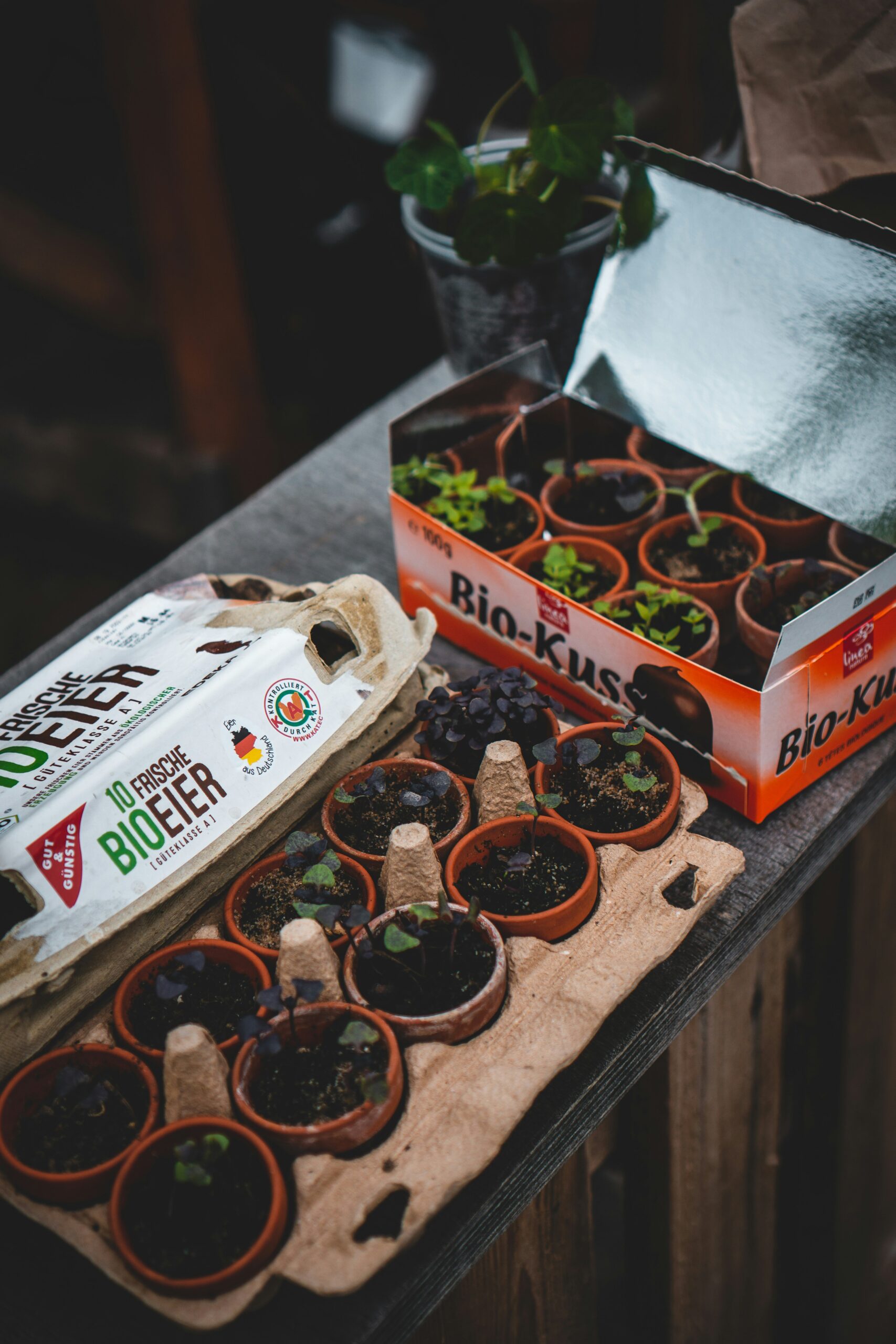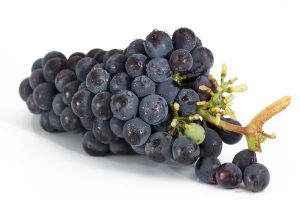In the world of agriculture and pest control, the question of how organic pesticides compare to conventional pesticides has been a hot topic of discussion. With the increasing concern for environmental sustainability and the desire for safe and healthy food products, it is important to understand the differences between these two types of pesticides. While conventional pesticides have been widely used for decades, organic pesticides have surged in popularity in recent years. In this article, we will explore the key distinctions between these two options and delve into the pros and cons of each, providing you with the knowledge to make informed decisions for your pest control needs.

Environmental Impact
Effects on soil health
Organic pesticides have a significantly lower impact on soil health compared to conventional pesticides. Organic pesticides are derived from natural sources such as plants, minerals, and microorganisms, which means they generally have fewer negative effects on soil structure and fertility. They do not contain synthetic chemicals that can disrupt the balance of the soil’s microbiome or harm beneficial organisms like earthworms. This is important because healthy soils are the foundation of sustainable agriculture and play a crucial role in nutrient cycling and water filtration.
Impact on water quality
Organic pesticides also have a positive impact on water quality. Unlike conventional pesticides, which can leach into groundwater or runoff into nearby water bodies, organic pesticides typically have reduced water solubility and are less likely to contaminate water sources. This is beneficial not only for human consumption but also for aquatic ecosystems, as organic pesticides have a lower risk of harming fish, amphibians, and other non-target organisms that rely on clean water.
Risk to non-target organisms
When it comes to the risk to non-target organisms, organic pesticides generally pose a lower threat compared to conventional pesticides. Organic pesticides are often target-specific, meaning they are designed to affect only the pests they are intended to control. This specificity can help to minimize the unintended harm to beneficial insects, birds, and other organisms in the ecosystem. Additionally, many organic farmers follow integrated pest management (IPM) practices, which involve using a combination of pest control techniques, including biological controls and cultural practices, to further minimize the need for pesticide use and protect non-target organisms.
Toxicity and Health Concerns
Chemical residues in food
One of the main concerns with conventional pesticides is the presence of chemical residues in food. These residues can be harmful to human health, especially when consumed over time or in large quantities. Organic pesticides, on the other hand, are subject to strict regulations and certification processes that limit the use of potentially harmful chemicals. As a result, organic produce generally has lower levels of pesticide residues, making it a safer choice for consumers who prioritize their health and well-being.
Worker safety
Worker safety is another important consideration when comparing organic and conventional pesticides. Conventional pesticides often contain synthetic chemicals that can be toxic to humans if not handled properly. Farmers and agricultural workers who come into direct contact with these pesticides are at risk of acute and chronic health effects, such as skin irritation, respiratory issues, and even more serious conditions like cancer. Organic pesticides, being derived from natural sources, generally pose lower risks to workers’ health, making organic farming a safer occupation.
Consumer exposure
In addition to worker safety, consumer exposure to pesticides is also a concern. When you choose organic produce, you can significantly reduce your exposure to pesticide residues, which can enter your body through food consumption. This is especially important for vulnerable populations such as pregnant women, infants, and children, who may be more susceptible to the negative effects of pesticide exposure. By choosing organic pesticides, farmers and consumers can work together to minimize overall pesticide use and reduce the potential risks associated with pesticide exposure.
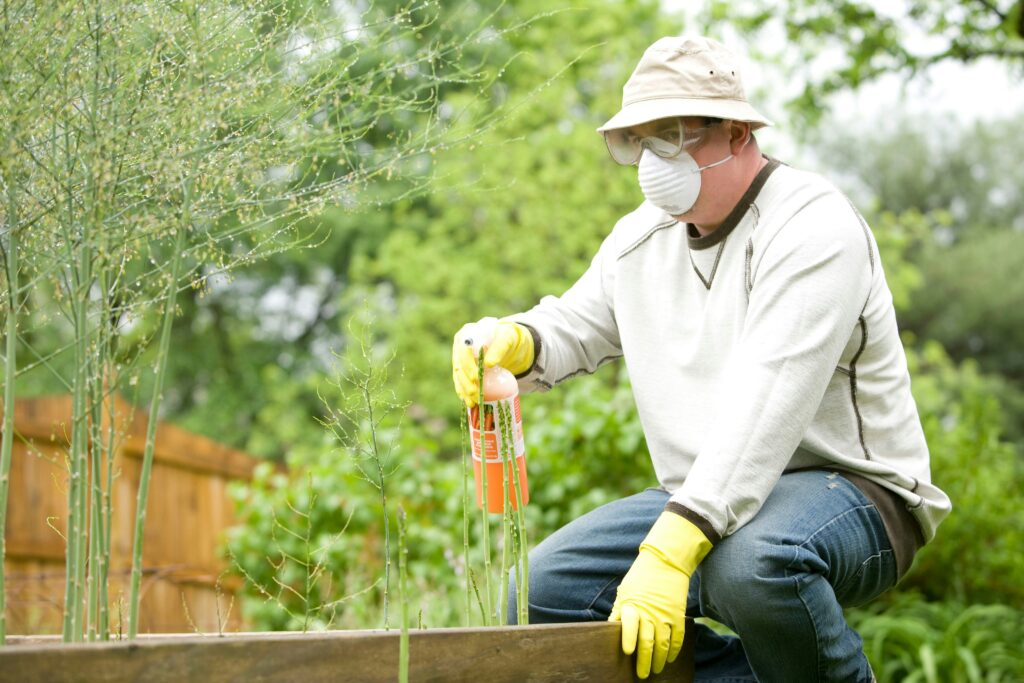
Effectiveness
Targeted pest control
Organic pesticides have been shown to be effective in controlling pests when used correctly. While they may not offer the same level of immediate knockdown as some conventional pesticides, organic alternatives can provide long-term pest management solutions. Organic pesticides often rely on the principles of integrated pest management (IPM), which involves using a combination of methods to control pests, including natural predators, crop rotations, and improved plant health. By targeting specific pests and minimizing their impact, organic pesticides can help maintain a balanced ecosystem and reduce the need for harsher chemical interventions.
Resistance management
One of the major challenges with conventional pesticides is the development of pesticide resistance in target pests. Pests can evolve and develop resistance to the chemicals used in conventional pesticides, rendering these products less effective over time. Organic pesticides, however, typically employ multiple modes of action, making it less likely for pests to develop resistance. By using organic pesticides as part of an integrated pest management strategy, farmers can reduce the risk of resistance and maintain the long-term effectiveness of their pest control methods.
Longevity of effects
The longevity of pesticide effects is another factor to consider when comparing organic and conventional pesticides. While conventional pesticides may provide immediate control of pests, their effects can deteriorate quickly, requiring frequent applications. Organic pesticides, on the other hand, often have a longer residual effect. This means that even after the initial application, the organic pesticide continues to provide protection against pests for an extended period, reducing the need for frequent reapplication. This can be beneficial not only in terms of cost and labor but also in minimizing overall pesticide use and potential environmental impacts.
Regulation and Certification
Certification process for organic pesticides
To ensure that organic pesticides meet strict standards, there is a rigorous certification process in place. In most countries, organic pesticides must be certified by a recognized certification body to be labeled and sold as organic. This process involves a thorough review of the pesticide’s ingredients, production methods, and adherence to organic principles and regulations. Certification ensures that organic pesticides are derived from natural sources and do not contain synthetic chemicals or genetically modified organisms. By adhering to these standards, organic pesticides provide consumers with the assurance that they are choosing products that align with their values and support sustainable agriculture.
Government regulations on conventional pesticides
Conventional pesticides are subject to government regulations and standards, but these regulations may not always prioritize environmental and human health concerns. While some conventional pesticides have been banned or restricted due to their harmful effects, many remain in use. The regulations often focus on establishing maximum residue levels in food and determining acceptable exposure levels for workers. However, the long-term impacts of these pesticides on the environment and human health may not always be fully understood or taken into account. In contrast, the certification process for organic pesticides places a greater emphasis on minimizing harm and promoting sustainability in agriculture.
Labeling and transparency
Clear labeling and transparency are important factors when considering the regulation of pesticides. Organic pesticides are required to have clear labeling that identifies their organic certification and lists the ingredients used. This allows consumers to make informed decisions about the products they purchase and consume. In contrast, conventional pesticides may not always provide detailed information about their ingredients or potential health risks. Greater transparency in labeling can help consumers understand and evaluate the potential environmental and health impacts associated with different pesticide options.
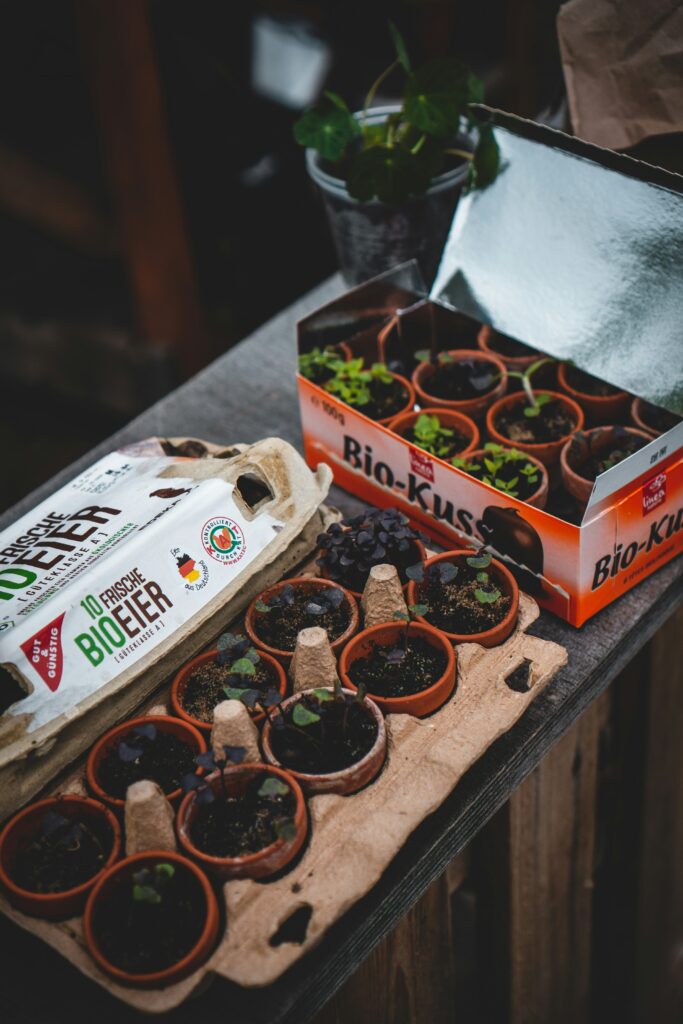
Availability and Cost
Availability of organic pesticides
The availability of organic pesticides has significantly increased in recent years as demand for organic products has grown. Organic farmers have access to a variety of approved organic pesticides, including those derived from plant extracts, beneficial insects, and naturally occurring minerals. Additionally, advancements in research and development have led to the development of new organic pest control methods, providing farmers with a wider range of options. While the availability of organic pesticides may still vary depending on the region and specific pest control needs, the market continues to expand to meet the growing demand for organic farming practices.
Comparative costs of organic and conventional pesticides
It is important to consider the comparative costs when deciding between organic and conventional pesticides. Organic pesticides may have slightly higher upfront costs compared to some conventional alternatives. However, when evaluating the long-term costs, including potential health impacts and environmental damage, organic pesticides often prove to be a more cost-effective choice. Additionally, organic farming practices that focus on soil health and natural pest control methods can reduce the overall reliance on pesticides, potentially further offsetting the costs. It is essential to look beyond immediate financial considerations and account for the broader benefits and impact of pesticide choices.
Accessibility to farmers
The accessibility of pesticides, both organic and conventional, is an important factor for farmers. Conventional pesticides are widely available and often more familiar to farmers, making them easily accessible. However, as awareness and demand for organic products have increased, so has the accessibility of organic pesticides. Many agricultural suppliers now offer a range of organic pest control options, and educational resources are available to support farmers transitioning to organic practices. While there may still be certain challenges in terms of availability and distribution, efforts are being made to improve accessibility and provide farmers with the tools and knowledge they need to adopt organic pest control methods.
Persistence and Breakdown
Residual effects in the environment
One of the advantages of organic pesticides is their reduced persistence in the environment. Organic pesticides often break down more quickly compared to conventional pesticides, which can persist in the environment for extended periods, leading to potential accumulation and long-term impacts. Organic pesticides, derived from natural sources, tend to degrade more rapidly, minimizing the risk of building up in soils, water bodies, or the food chain. This is particularly significant for maintaining the overall health and balance of ecosystems and reducing the potential for unintended harm to non-target organisms.
Persistence in crops and soil
The persistence of pesticides in crops and soil can impact both the environment and human health. Conventional pesticides can leave residues in crops, which may persist even after harvest and processing. This poses concerns for human consumption and the potential accumulation of chemical residues in the food supply. Organic pesticides, designed to be less persistent, have lower chances of leaving residues in crops, making them a preferred choice for those seeking to minimize pesticide exposure. Furthermore, organic farming practices focus on building healthy and resilient soils, which can help promote natural breakdown processes and minimize the persistence of any residual pesticides in the soil.
Breakdown rates
The breakdown rates of pesticides can vary significantly depending on their composition and chemical properties. Conventional pesticides often contain synthetic chemicals that are designed to be persistent and effective over extended periods. However, these same properties that make them effective also contribute to their longer breakdown rates. Organic pesticides, derived from natural sources, tend to have shorter breakdown rates as they are more susceptible to degradation by environmental factors such as sunlight, moisture, and microbial activity. These faster breakdown rates are advantageous for minimizing the potential impacts of pesticides on the environment and reducing the residue levels in crops and soil.
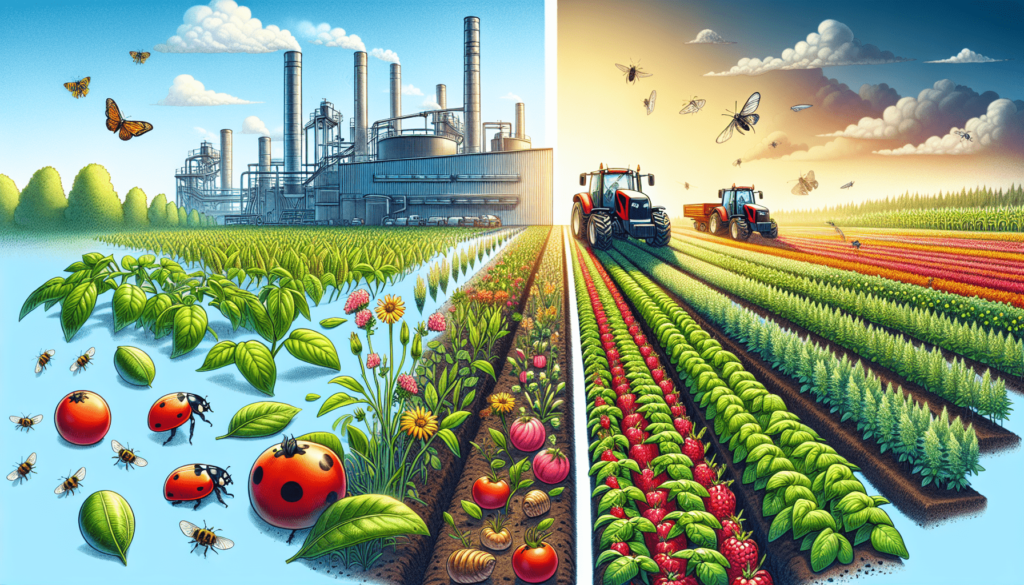
Crop and Soil Compatibility
Effect on crop yield and quality
The effect of pesticides on crop yield and quality is a critical consideration for farmers. Organic pesticides, when used properly, can effectively control pests and diseases, leading to comparable yields and quality to those achieved with conventional pesticides. However, organic pesticides often work more gradually and may require more frequent applications to maintain pest control. This means that organic farmers may need to invest more time and effort into pest management strategies compared to their conventional counterparts. Nevertheless, studies have demonstrated that well-managed organic systems can achieve yields and quality levels that are on par with conventional farming practices, offering a sustainable and environmentally friendly approach to crop production.
Soil microbiome impact
The soil microbiome plays a vital role in maintaining soil health and fertility. Conventional pesticides can disrupt the delicate balance of microorganisms in the soil, potentially negatively impacting nutrient cycling and overall soil health. In contrast, organic pesticides, derived from natural sources, are generally considered more compatible with the soil microbiome. They are less likely to harm beneficial microorganisms and can contribute to fostering a diverse and resilient soil microbial community. The preservation of the soil microbiome in organic farming practices is essential for maintaining long-term soil productivity and sustainability.
Compatibility with organic farming practices
Organic farming relies on a holistic approach to crop production, taking into account the interconnections between soil health, environmental sustainability, and human health. Organic pesticides are an integral part of this approach, as they align with the principles of organic farming – promoting ecological balance, conserving biodiversity, and using natural resources responsibly. The compatibility of organic pesticides with organic farming practices is a key advantage, as they support the overall goals of sustainability and minimize the environmental and health risks associated with conventional pesticide use. By integrating organic pesticides into organic farming systems, farmers can prioritize both productivity and long-term sustainability.
Environmental Adaptability
Effectiveness in different climatic conditions
Different climatic conditions can present unique challenges to pest management. Organic pesticides have demonstrated effectiveness across a range of climates, making them adaptable to various growing regions and environments. While some conventional pesticides may be developed for specific climate conditions, organic pest control methods often utilize a combination of cultural practices, biological controls, and target-specific organic pesticides. This multifaceted approach helps farmers address pest issues effectively regardless of their specific climate conditions, contributing to the broader adaptability of organic farming practices.
Resistance to weathering
The ability to withstand weathering and environmental conditions is essential for any pesticide. Organic pesticides, derived from natural materials, generally exhibit good resistance to weathering. They are designed to degrade over time, minimizing their persistence in the environment. Organic pesticides can tolerate exposure to sunlight, rainfall, and temperature fluctuations, which helps maintain their effectiveness while minimizing potential negative impacts on the environment. This resistance to weathering contributes to the overall suitability of organic pesticides for sustainable pest management practices.
Long-term impact on ecosystems
Considering the long-term impact on ecosystems is crucial when evaluating pesticide options. Conventional pesticides, with their potential for environmental accumulation and persistence, can have significant long-term impacts on ecosystems. Organic pesticides, designed to work more in harmony with nature, are less likely to cause long-term harm to ecosystems. The use of organic pesticides, coupled with other sustainable practices, can contribute to the preservation and restoration of biodiversity, the promotion of natural habitats, and the overall health of ecosystems. By reducing dependence on conventional pesticides and adopting organic pest control methods, farmers can play a vital role in safeguarding the long-term health and vitality of the ecosystems surrounding their farms.
Integrated Pest Management
Role in integrated pest management strategies
Integrated pest management (IPM) is a holistic approach to pest control that emphasizes the use of multiple tactics to manage pests, reduce reliance on pesticides, and promote sustainable agriculture. Organic pesticides play an important role in IPM strategies as they are considered a valuable tool in the overall pest management toolbox. Organic pesticides can be combined with other IPM methods such as biological controls, cultural practices, and monitoring systems to create a comprehensive and effective approach to pest control. By integrating organic pesticides into IPM strategies, farmers can minimize the use of conventional pesticides and create more sustainable pest management systems.
Synergistic effects with other control methods
The use of organic pesticides in combination with other pest control methods can have synergistic effects, further enhancing pest management outcomes. Organic pesticides can be used in conjunction with cultural practices like crop rotation, planting resistant crop varieties, and sanitation measures to create a layered defense against pests. Additionally, organic pesticides can complement the use of biological controls, such as beneficial insects or nematodes, by providing additional support in controlling pests during periods of high pressure. By strategically incorporating organic pesticides into a broader pest management approach, farmers can maximize the effectiveness of their pest control efforts while minimizing the environmental and health impacts.
Potential for reducing pesticide use
One of the significant advantages of organic pesticides is their potential to reduce overall pesticide use. By adopting organic pest control methods and practices such as IPM, farmers can minimize their reliance on conventional pesticides, which are often more potent and have a higher risk of negative impacts. Organic pesticides, when used in combination with other pest control measures, can effectively manage pests while minimizing the need for excessive pesticide application. This reduction in pesticide use has positive implications for environmental sustainability, human health, and the long-term preservation of ecosystems.
Consumer Perception
Consumer preference for organic produce
Consumer preference for organic produce has been on the rise in recent years. Many consumers are drawn to organic products due to concerns about pesticide residues, environmental sustainability, and the potential health benefits. By choosing organic pesticides, farmers can respond to the growing demand for organic produce and meet the expectations of consumers who prioritize environmentally friendly farming practices and the avoidance of synthetic chemical residues in their food.
Awareness of pesticide residues
Consumer awareness regarding pesticide residues in food has increased substantially. Many consumers are concerned about the potential health risks associated with pesticide exposure and seek out organic products as a way to mitigate these concerns. Organic pesticides, with their lower levels of residues, offer consumers a viable choice for reducing their exposure to potentially harmful chemicals. Greater awareness of pesticide residues and their potential impacts has driven the demand for organic produce and encouraged the use of organic pest control methods.
Perceived benefits of organic pesticides
Consumers perceive organic pesticides as a safer and more environmentally friendly alternative to conventional pesticides. Organic pesticides are derived from natural sources and undergo rigorous certification processes, giving consumers confidence in their safety and quality. The perceived benefits of organic pesticides, such as reduced environmental impact, lower pesticide residues, and support for sustainable farming practices, resonate with consumers who value these attributes in their food choices. The adoption of organic pesticides aligns with consumer expectations and preferences, contributing to the positive perception and demand for organic produce.
In conclusion, organic pesticides offer a range of advantages over conventional pesticides when it comes to environmental impact, toxicity and health concerns, effectiveness, regulation and certification, availability and cost, persistence and breakdown, crop and soil compatibility, environmental adaptability, integrated pest management, and consumer perception. From minimizing harm to soil health and water quality to reducing pesticide residues in food and supporting sustainable farming practices, organic pesticides provide a more environmentally friendly and healthier alternative. By incorporating organic pesticides into pest management strategies, farmers can manage pests effectively while reducing their reliance on conventional pesticides. As consumer awareness and demand for organic products continue to grow, the adoption of organic pesticides becomes increasingly vital in ensuring a sustainable and healthier future for agriculture and the environment.

